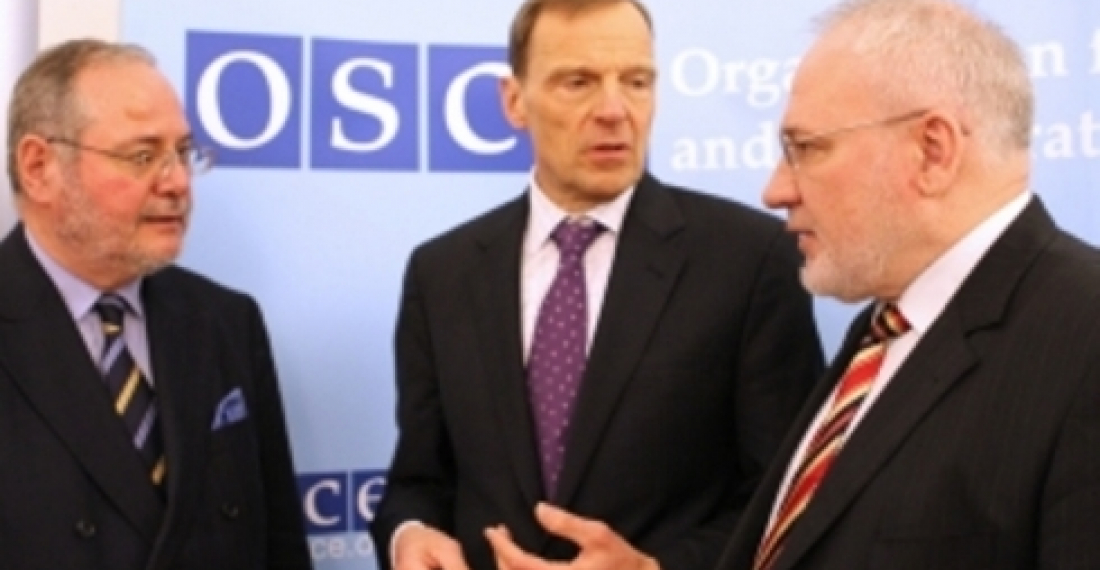The MINSK PROCESS
(1) What is it?
The OSCE Minsk Process is the mechanism that the international community has designated to try to find a resolution to the conflict between Armenians and Azerbaijanis on Nagorno-Karabakh and other issues.
The process was launched in embryonic form in 1992 in the framework of the Conference on Security and Co-operation in Europe, but became more formal when that institution became an organization (OSCE) in 1994.
(2) Why is it called the Minsk Process?
The original idea was to prepare the sides in the conflict to participate in an international conference in Minsk. The conference never took place, and the process has no relationship with Minsk whatsoever, but it continues using this name because the sides could not agree on a new name for it.
(3) Who is in charge of the Minsk Process
Formally it is the OSCE and more specifically a group of member states of the OSCE that were originally designated to organize the Minsk Conference, but in fact it is the three countries that co-Chair the group, France, Russia and the United States who are in charge. Other members of the group and other OSCE member states sometimes complain that they are not even informed of what is going on.
(4) Who are the people involved?
The three co-chair countries are represented by diplomats, usually Ambassadors or diplomats of similar rank. The three current co-Chair are Ambassadors Igor Popov (Russia), Jacques Faure (France) and Ian Kelly (USA).
(5) And who does the day to day work?
For a long time the continuity of the process has been kept by Ambassador Andrzej Kasprzyk who every year is appointed as the special representative of the OSCE Chairman-in-Office. He is assisted by a small team of field officers based in the region.
(6) France is one of the co-chair countries. Does that mean the European Union is represented?
No France is a co-Chair in her own right and does not represent the EU. At its pleasure it sometimes keeps the EU informed of developments in the process.
(7) What are the Madrid Principles?
The Madrid Principles are a set of ideas based on the 1975 Helsinki Final Act which were presented to Armenia and Azerbaijan by the Minsk Group co-Chair during the OSCE Meeting in Madrid in 2007. The principles have since been fine-tuned in line with discussions held with the sides. They aim to provide the sides with a framework within which they can then start negotiating a peace agreement. They provide for a phasedArmenian withdrawal from Azerbaijani territory around Nagorno-Karabakh which they occupied during the conflict, opening up of communications, demining and demilitarization, after which it is envisaged to deploy a peacekeeping force and the granting of an interim status to the territory. They also envisage a legally binding public expression of will to determine the future status of Nagorno-Karabakh. In their generic format the Madrid Principles have been accepted by the sides, "with some reservations". However once the sides started asking for details and clarifications it became clear that the distance between them was still substantial.
(8) What are the biggest achievements of the Minsk Group?
Individual diplomats representing the three co-chair countries have often said that the fact that no new conflict has taken place between Armenia and Azerbaijan over the last two decades is thanks to the efforts of the Minsk Process. There were times when the Group expressed optimism that a solution was round the corner, but it never happened. The Group has managed to keep the sides talking, even in times of tension, but in the last two years even that has become difficult.
(9) What are the biggest criticisms of the Minsk Group?
They are sometimes criticized for not having delivered. But to say this is unfair since it hardly depended on them. However the way the process has been managed, the way the sides were allowed to engage with it, and the secrecy surrounding every step of the negotiations are sometimes mentioned as things that could have been done differently.
( 10) Is there a chance that the work of the OSCE Minsk Group will ever succeed?
There are different views on this. Officially most diplomats and politicians will tell you that it is the best mechanism available and the sides have to make it work. In private some are saying now that the process has ran out of steam. For the moment everybody seems to be happy to leave it in the laps of France, Russia and the United States. But for how long?
This Q and A was compiled by the staff of Commonspaceextra, based on publicly available material.







